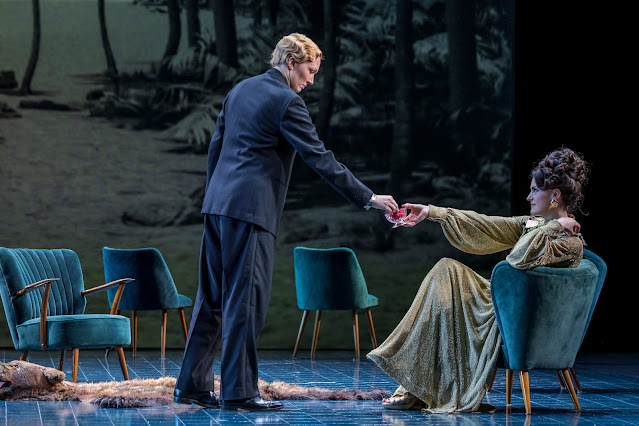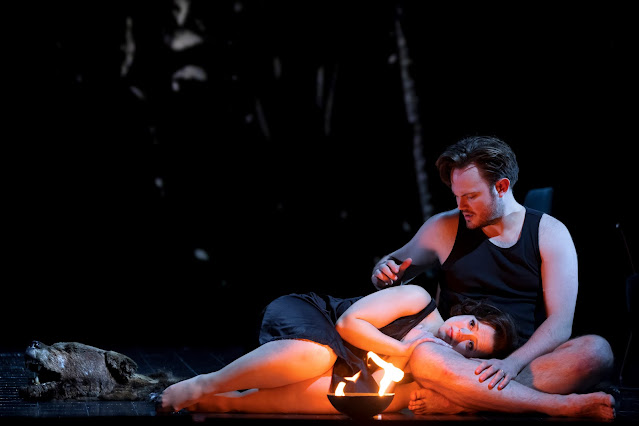 |
| Handel: Alcina - Mari Askvik, Máire Flavin - Opera North (Photo James Glossop) |
Handel Alcina; Máire Flavin, Fflur Wyn, Mari Askvik, Patrick Terry, Nick Pritchard, dir: Tim Albery, cond: Laurence Cummings; Opera North at Grand Theatre, Leeds
Reviewed by Robert Hugill on 5 February 2022 Star rating: (★★★★½)
Proudly sustainable and highly imaginative, Tim Albery's new production of Alcina brings out the characters' intense emotional journeys
Handel was rather fond of enchantresses; they pop up in his operas both early and late. It wasn’t the power per se that seems to have interested him but the ability it conferred for the character to be whatever she wanted to be. Sorcery, enchantment gave female characters agency so Handel’s enchantresses are always interesting and usually transgressive, ‘bad girls’ if you will. Alcina is one of Handel’s last enchantresses, and since the Handel opera revival of the early 20th century she has been on regular display.
Tim Albery’s new production of Handel’s Alcina for Opera North opened at the Grand Theatre, Leeds on Saturday 5 February 2022 with Mari Askvik as Bradamante, Claire Pascoe as Melissa, Fflur Wyn as Morgana, Máire Flavin as Alcina, Patrick Terry as Ruggiero and Nick Pritchard as Oronte. Laurence Cummings conducted, designs were by Hannah Clark, lighting by Matthew Richardson and video by Ian William Galloway.
Like most modern directors, Tim Albery was uninterested in Alcina’s magic for its own sake, there was none of the vivid theatrical display beloved by Handel’s contemporaries. Instead, this magic enables Alcina to live a life of isolated contentment, indulging herself as she pleases. A production of Alcina set in an oligarch’s luxury villa would, in many ways, work dramaturgically, though sometimes I do long for a production with the theatrical dazzle of the 18th century and an ending completely true to the libretto.
 |
| Handel: Alcina - Claire Pascoe, Patrick Terry, Máire Flavin, Mari Askvik - Opera North (Photo James Glossop) |
Here we were in the realm of the imagination. The production is proudly sustainable, so the costumes were pre-loved, with 1950s and 1960s glamour a key theme, the women creating their own magic. At the opening there was a bare stage with just lighting rig and chairs (1960s style velour bucket seats), then as Melissa entered, the lighting rig raised up and the video started. This created the journey to Alcina’s island with its lush tropical vegetation, which made a big contrast with the velour chairs. But that is the idea; Alcina’s enclave is not at all natural.
Though nothing was said explicitly, budget had clearly been a consideration. The cuts in the opera (and these are needed for this type of touring repertory production) removed the chorus, the dances and the character of Oberto. This had the effect of concentrating on Handel’s drama for the protagonists yet removed a key element of theatrical show present in the original. The ending had much of its magical dazzle removed (no urn with Alcina’s heart in it). Instead, Albery reverted to a pre-Handel version of the libretto, so Melisso, Bradamante’s tutor reverted to being Melissa, another enchantress, and it was her agency that brought about the end. Though Alcina’s power was gone, she did not die.
Albery was most interested in the human drama, the upsets that occur to this perfect world with the advent of two disruptive elements (Bradamante and Melissa). The production style was fluid and action from one scene bled into another. In a way, it was quite a busy production but one with a clear sense of the dramaturgy and by the end of Part One (two thirds of the way through Act II) we were vividly gripped by the almost soap opera-like shenanigans. And it is soap opera, just write the plot down! But it is this sort of heightened emotionalism that enables Handel to probe his characters’ hearts as they go through extremes.
 |
| Handel: Alcina - Ffur Wyn, Nick Pritchard - Opera North (Photo James Glossop) |
Máire Flavin was a fascinating Alcina in 1960s film star glam mode, channelling Monica Viti or Rita Hayworth perhaps, one of the first images of her stalking across the stage was truly memorable. And it worked, there was something cool and seductive about her, and mysterious. And then as the glam failed, she fell to pieces big time. Alcina’s big Act II finale aria, 'Ombre pallide' (now opening Part Two) became almost a mad scene, powerful and intense, and throughout Part Two we watched her disintegrate, magnificently in a remarkable performance.
As Morgana, Fflur Wyn (in her 22nd role for Opera North) was not so much a flirt as a free spirit, determined not to be confined. She incarnated that delightful yet dangerous changeableness that occurs in a number of Handel’s heroines, but Wyn also gave her an element of sadness too, the seeking and never finding. Her Act I finale showpiece, ‘Tornami a vagheggiar’ was brilliant but also touching with a sense of character. And Wyn was similarly touching as her world collapsed; her new love turns out to be a woman in disguise and her previous love is too wounded to allow a return of the status quo.
It takes a lot of skill and technique to make this work. With Flavin, Wyn and all the cast we thought less about virtuosity and more about character because the singers were able to use their technical skill to create character.
Tall and striking, Mari Askvik seems born to play Handel’s cross-dressing roles (Bradamante was written for Maria Caterina Negri, a contralto who specialised in travesty roles). Here, in a trouser suit and breast-plate with a Marcel wave blond bob, she created a striking and vivid images. In many ways there was a coolness about Askvik’s performance, something of the observer. She dealt with Morgana’s infatuation with amused tolerance, but it was not all plain sailing and the cool observer found herself drawn in, her lover torn between herself and Alcina, unable to leave.
 |
| Handel: Alcina - Nick Pritchard, Ffur Wyn, Mari Askvik - Opera North (Photo James Glossop) |
The role of Ruggiero was written for the mezzo-soprano castrato Giovanni Carestini, so it lies somewhat high for a counter-tenor. Once the sole preserve of female mezzo-sopranos, counter-tenors have more recently started to sing the role. It was clear that it sat high for Patrick Terry, but he used this to give a sense of otherworldly uncertainty to the character. He conveyed well the sense of Ruggiero being completely absorbed in Alcina’s enchantment. Even when the spell was a broken, it lingered so that the whole of Part Two was very much about the difficulty of letting go. He made ‘Verdi prati’ lingeringly beautiful, whilst ‘Sta nell’Ircana’ was fleet, light and vivid.
Nick Pritchard’s Oronte was a decent man pushed to his limits by being in love with the wilful Morgana. His Act III aria when he breaks down was both a tour de force and profoundly moving. He also lost most of his clothes; it was that sort of production.
Claire Pascoe’s Melissa didn’t have all that much to do but Pascoe (a member of the Opera North chorus) brilliantly suggested that she was the one who actually knew what was really going on, she radiated calm authority and her aria was full of character.
In the pit, from the first notes of the overture it was clear that Laurence Cummings and the orchestra of Opera North meant business. This was a strong, characterful account of the score with plenty of theatrical pizzazz. Cummings directed from the harpsichord with a second instrument played by Asako Ogawa, plus two theorbo players (Alexander McCartney and Dorothy Linnell), so there was a thread of strong continuo running through the performance. And impressively, these were the only visitors, the remainder of the ensemble being the orchestra’s regular players.
Ian William Galloway’s video very much set the tone for the performance; as the action became more complex we drew closer to the centre of the island and vegetation became lusher, and as Alcina’s power waned things became darker. A very modern take on the theatricality of Handel’s day.
 |
| Handel: Alcina - Mari Askvik, Patrick Terry, Nick Pritchard, Claire Pascoe, Fflur Wyn, Máire Flavin - Opera North (Photo James Glossop) - Opera North (Photo James Glossop) |
This was a production that engaged by the sheer sense of character engendered by the singers, drawing us into their world and making us care. A good indication of this was the way the long first part (nearly two of Handel’s acts) flew by. And with Laurence Cummings in charge in the pit there was plenty of style too.
You can catch the production online when it is streamed on OperaVision from 17 February 2022.
Never miss out on future posts by following us
The blog is free, but I'd be delighted if you were to show your appreciation by buying me a coffee.
Elsewhere on this blog
- Femi Elufowoju jr’s imaginative reinvention of Verdi's Rigoletto features some strong, compelling performances - opera review
- Not an additional ornament: as he prepares to direct Handel's Tamerlano, Dionysios Kyropoulos discusses bringing historical stagecraft to the modern stage - interview
- Jonathan Miller's production of Puccini's La bohème is in fine fettle as it returns to the London Coliseum - opera review
- The Flat Consort: Fretwork evoke afternoons in Hereford with composer Matthew Locke performing with friends - record review
- Enchantresses: Sandrine Piau is on vivid form in this recital of arias from Handel's operas from Rinaldo to Alcina - record review
- Robert Max in Bach's six Cello Suites at Conway Hall - concert review
- Love & dissimulation: Alessandro Stradella's opera Amare e fingere explores the 17th centuries fascination with Arcadia - record review
- Expanding her horizons: Lada Valesova on conducting Tchaikovsky's Eugene Onegin at Opera Holland Park this Summer - interview
- 1772: A Retrospective - The Mozartists in Mozart, Haydn and more exploring the musical world of the 16-year-old composer - concert review
- Inspired by the Sistine Chapel: Peter Phillips & The Tallis Scholars explore some of the riches written for the Papal choir - concert review
- The Irish Double Bass: Malachy Robinson goes on a personal odyssey - record review
- Love, jealousy, death and a wedding: Handel's Aci, Galatea e Polifemo from Orchestra of the Age of Enlightenment - concert review
- Home

.jpg)









No comments:
Post a Comment